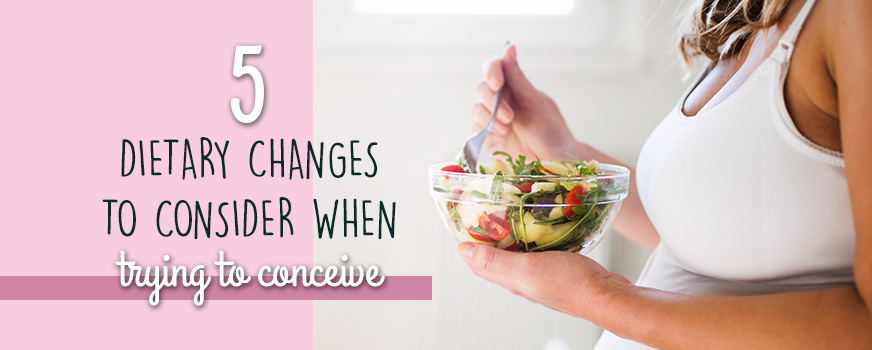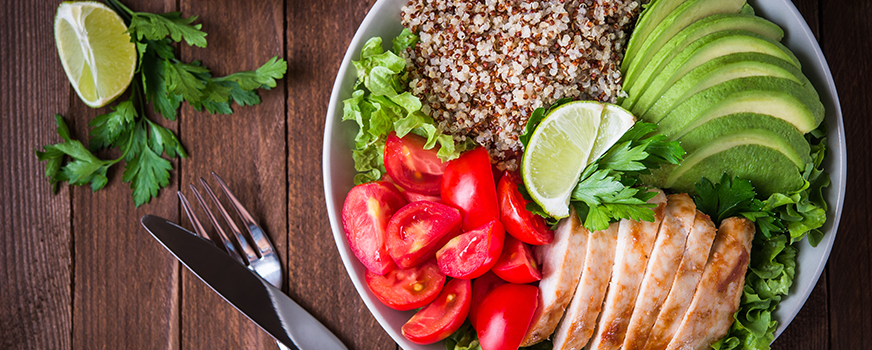
In an ideal world, trying to get pregnant should be a stress-free process with no complications. Unfortunately, that’s not always the case. There are many factors that affect your ability to conceive and diet is one of them. If you are struggling to get pregnant or want to be proactive in increasing your fertility health, consider these fertility diet tips that have shown to improve your health and reproductive success.
Lifestyle & Dietary Changes to Increase Fertility
Eat a Well-Balanced Diet
Having a healthy body and nutritious fertility diet are important when trying to conceive. This means eating a good balance of vitamins and nutrients. Grains, fruits, vegetables, proteins, and dairy products are just a few examples of foods that increase fertility.
People trying to conceive should stay away from fad diets that limit food groups or types of nutrients. If your body is nutrient deficient it is less likely to accept a pregnancy that will require even more nutrients. One’s levels of calcium, iron, vitamin C, folic acid, and vitamin A contribute to fertility in both men and women.
Stop Smoking
Many people believe that they do not need to worry about stopping smoking until they are already pregnant. This is not the case for people who are struggling with infertility. The American Society for Reproductive Medicine reports that as many as 13 percent of all diagnoses of infertility in females is due to smoking. During pregnancy, smoking can cause birth defects, and nicotine withdrawals can be difficult on both the mother and the unborn baby. All smoking should cease before a couple starts trying to get pregnant.
Reduce Caffeine Intake
Just a little caffeine can greatly reduce your chance of getting pregnant. In one fertility study researchers found that women who consumed more caffeine than the equivalent of one cup of coffee a day were 50 percent less likely to conceive than women who consumed less caffeine. One should keep in mind that, not just coffee, but other items such as soda, teas, and chocolate can contain caffeine as well. To maintain a healthy fertility diet, avoid these food items as much as possible and watch your caffeine intake.

Achieve a Healthy Weight
It has been found that overweight women suffer from a higher risk of infertility-related health issues. If you are overweight, one of the most effective things you can do is adopt a healthy fertility diet and shed some of those extra pounds. This applies to both men and women.
Weight can affect hormones that can disrupt fertility. Weight affects people differently, so one person who is overweight might have weight-related fertility problems while another much more obese person may not see a decrease in fertility. If you are overweight, fertility can be greatly increased with only a 5 to 10 percent decrease in body weight. Start by improving your diet and conceiving will hopefully become an easier process for you and your partner.
Take a Vitamin Supplement
The best way to get your vitamins and other nutrients is by eating nutrient rich foods – the body is designed to efficiently break down these foods and absorb the nutrients. However, it is sometimes difficult to get an appropriate amount of nutrients every day just from the food that one eats. Both men and women should take a multivitamin supplement every day to not only improve health, but improve chances of conception too. Studies have shown that an estimated 20 percent of ovulatory infertility may be avoided if women consume 3 or more multivitamins per week.
While multivitamins are beneficial for your diet and conceiving, it’s important to remember that it is just a supplement and not a replacement or substitute for eating healthy foods.
While there are many different factors that affect your ability to conceive, diet is a major one to consider. With some lifestyle changes and consumption of foods that increase fertility, you can give yourself better odds for getting pregnant. If you still find yourself struggling, learn what you need to know about your ovulation cycle and schedule an appointment with a fertility specialist to discuss your options.



